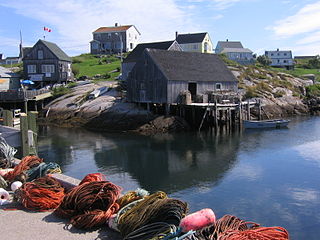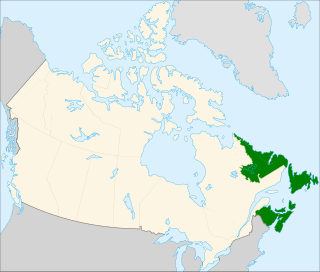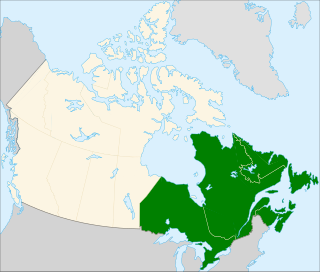
The Maritimes, also called the Maritime provinces or the Canadian Maritimes, is a region of Eastern Canada consisting of three provinces: New Brunswick, Nova Scotia, and Prince Edward Island (PEI). The Maritimes had a population of 1,813,606 in 2016. Together with Canada's easternmost province, Newfoundland and Labrador, the Maritime provinces make up the region of Atlantic Canada.

New Brunswick is one of four Atlantic provinces on the east coast of Canada. According to the Constitution of Canada, New Brunswick is the only bilingual province. About two thirds of the population declare themselves anglophones and a third francophones. One third of the overall population describe themselves as bilingual. Atypically for Canada, only about half of the population lives in urban areas, mostly in Greater Moncton, Greater Saint John and the capital Fredericton.

Atlantic Canada, also called the Atlantic provinces, is the region of Canada comprising the four provinces located on the Atlantic coast, excluding Quebec: the three Maritime provinces – New Brunswick, Nova Scotia, and Prince Edward Island – and the easternmost province of Newfoundland and Labrador. The population of the four Atlantic provinces in 2016 was about 2,300,000 on half a million km2. The provinces combined had an approximate GDP of $121.888 billion in 2011.
The International Chamber of Commerce is the largest, most representative business organization in the world. Its 6 million members in over 100 countries have interests spanning every sector of private enterprise.
The Canadian Baptists of Atlantic Canada (CBAC), formerly known as Convention of Atlantic Baptist Churches (CABC), is an association of Baptist Churches in the eastern provinces of Canada. The offices of the CBAC are located in Saint John, New Brunswick. The union is one of four components of Canadian Baptist Ministries.
The Department of Natural Resources, operating under the FIP applied title Natural Resources Canada (NRCan), is the ministry of the government of Canada responsible for natural resources, energy, minerals and metals, forests, earth sciences, mapping and remote sensing. It was created in 1995 by amalgamating the now-defunct Departments of Energy, Mines and Resources and Forestry. Natural Resources Canada (NRCan) works to ensure the responsible development of Canada's natural resources, including energy, forests, minerals and metals. NRCan also uses its expertise in earth sciences to build and maintain an up-to-date knowledge base of our landmass and resources. To promote internal collaboration, NRCan has implemented a departmental wide wiki based on MediaWiki. Natural Resources Canada also collaborates with American and Mexican government scientists, along with the Commission for Environmental Cooperation, to produce the North American Environmental Atlas, which is used to depict and track environmental issues for a continental perspective.

Eastern Canada is generally considered to be the region of Canada east of Manitoba, consisting of the following provinces:

The Isle of Man Government is the government of the Isle of Man. The formal head of the Isle of Man Government is the Lieutenant Governor, representing Queen Elizabeth II, Lord of Mann. The executive head is the Chief Minister.
Section 91(2) of the Constitution Act, 1867, also known as the trade and commerce power, grants the Parliament of Canada the authority to legislate on:

Atlantic Canadian English is a class of Canadian English dialects spoken in the Atlantic provinces of Canada and is notably distinct from Standard Canadian English. Atlantic Canadian English comprises Canadian Maritime English and Newfoundland English. It is mostly influenced by British and Irish English, Irish and Scottish Gaelic, and some Acadian French. Atlantic Canada is the Easternmost region of Canada, comprising four provinces located on the Atlantic coast - the three Maritime provinces: Nova Scotia, New Brunswick, and Prince Edward Island, as well as Newfoundland and Labrador. The population of the Atlantic Provinces in 2016 was about 2,300,000 on a land area of approximately half a million square kilometers, with Nova Scotia being the most populous province, and its capital, Halifax, the most populous city.

CBH-FM is a Canadian radio station broadcasting in Halifax, Nova Scotia at 102.7 MHz. The station was launched on June 1, 1976 and is the CBC Music outlet for Nova Scotia, New Brunswick and Prince Edward Island. CBH-FM's studios are located on 7067 Chebucto Road in Halifax, while its transmitter is located on Washmill Lake Drive in Clayton Park.
The Toronto Region Board of Trade is one of the largest and most influential chambers of commerce. Its constant flow of ideas, people and introductions to city-builders and government officials firmly roots it as a connector for─and with─the business community. The Board acts as a catalyst for the region's growth agenda, at home and on a global scale with its World Trade Centre Toronto franchise. Backed by more than 12,000 members, it advocates on their behalf for policy change that drives the growth and competitiveness of the Toronto region. It wants Toronto to be recognized as one of the most competitive and sought-after business regions in the world, and believes this reputation starts with members and their business.
The Atlantic Provinces Economic Council is a Canadian independent, non-partisan research and educational institution founded in 1954 whose objective is to promote the economic development of Atlantic Canada.

Alexander Henderson Manning was a Canadian contractor, businessman, and the 20th Mayor of Toronto, serving a single term in 1873 and a second in 1885. He was also a member of the Orange Order in Canada.

Missanabie is a community in the Canadian province of Ontario, located in the Algoma District at the northern terminus of Highway 651, inside the boundaries of the Chapleau Crown Game Preserve.
Denis Losier is a businessman, economist and former public servant and politician. He was appointed to the Security Intelligence Review Committee on September 3, 2008 and by virtue of that position has been sworn in as a member of the Queen's Privy Council for Canada.

The regions, formerly known as the government office regions, are the highest tier of sub-national division in England. Between 1994 and 2011, nine regions had officially devolved functions within government. While they no longer fulfill this role, they continue to be used for statistical and some administrative purposes. They define areas (constituencies) for the purposes of elections to the European Parliament. Eurostat also uses them to demarcate first level Nomenclature of Territorial Units for Statistics (NUTS) regions within the European Union. The regions generally follow the boundaries of the former standard regions, established in the 1940s for statistical purposes.
The Union of Chambers and Commodity Exchanges of Turkey is a confederation of all local chambers of commerce, industry and maritime as well as commodity exchanges in Turkey. The union was founded on March 8, 1950 as an umbrella organization in Ankara as the country's highest legal entity representing the private sector. Its president is M. Rifat Hisarcıklıoğlu since 2001.












